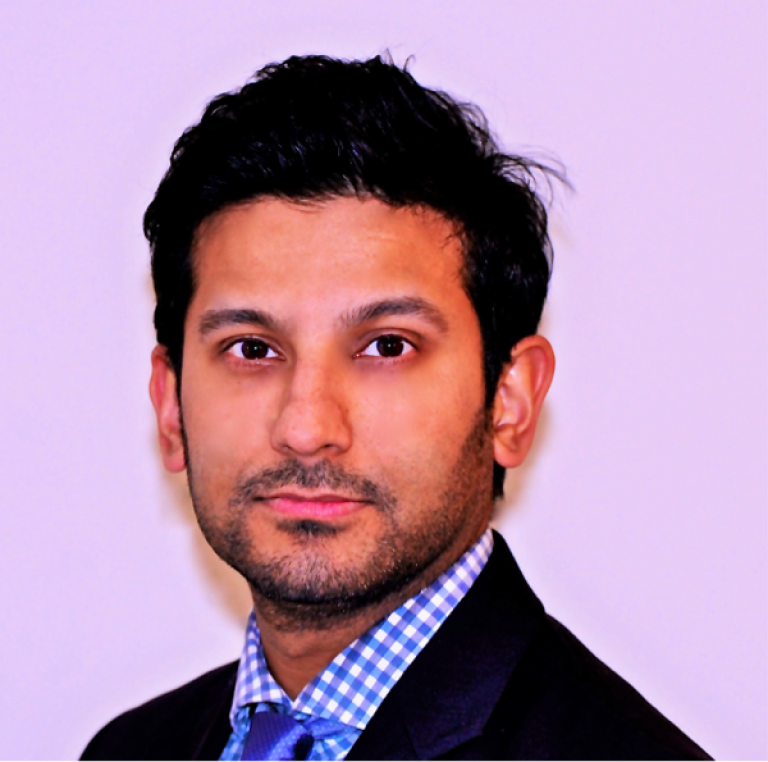Meet The Professor: Manish Chand
11 December 2019
We caught up recently with Professor Manish Chand, Consultant Colorectal Surgeon and Associate Professor at UCL, and asked him our ‘Top Ten’ questions to understand his pioneering work and motivations – and here are his thought-provoking answers…

Manish Chand, who is a Consultant Colorectal Surgeon and Associate Professor at UCL. He is also UCL’s Director of the MS in Advanced Minimally-Invasive Surgery. Manish has presented several lectures across the globe and has over 100 peer-reviewed publications and book chapters. He is a Key Opinion Leader and recognised expert in laparoscopic rectal cancer surgery and imaging of rectal cancer. He works closely with innovative digital surgery research including the AIS Channel and Touch Surgery.
Currently, Manish leads on colorectal cancer research at UCL, specifically fluorescence guided surgery, advanced imaging modalities and augmented reality. This includes supervising a number of postgraduate students. The Masters programme of which he is Director is considered the most innovative and technologically advanced surgery programme of its type with a leading international faculty. We caught up with him recently and asked him our ‘Top Ten’ questions to understand his pioneering work and motivations – and here are his thought-provoking answers…
Question 1: What are the latest evolutions in the use of virtual reality in surgery?
Manish: We are beginning to see gaming technology permeate its way into many different areas of healthcare. Virtual and Augmented Reality allow highly accurate simulation to be used in the preparation and planning of surgery as well as having the potential to augment the actual procedure itself.
Question 2: In what ways will these developments improve surgery outcomes in the future?
Manish: The premise is that surgery can be made more ‘invidualised’ and more precise which we know leads to better patient outcomes. Surgery involves treating a pathological process whilst minimising any collateral injury. Pre-operative planning using VR and intraoperative guidance with AR will potentially allow surgeons to perform surgery in a more precise fashion.
Question 3: Will these tech advances in surgery eventually realise cost savings for the NHS?
Manish: Yes, one would hope so. Efficiency and precision will no doubt lead to cost savings as if you get it right the first time, not only do you get better clinical outcomes, you also save money on additional treatment.
Question 4: Whilst you work in colorectal surgery, will the tech you are developing be compatible with other or all types of surgery one day?
Manish: The technology we are investigating in and developing is very generic and will be applicable to all types of surgery. It relies on highly accurate scans such as CT and MRI, but these are often used across the board. The computer processing of these images can be applied to any scans. We hope that all surgeons will have access to this type of technology in the future.
Question 5: Can you explain why you believe standardisation in surgery is important?
Manish: We know how standardisation of manufacturing and many processes in other industries has led to greater efficiency and better outcomes, but we have been slow to standardise within healthcare and, in particular, surgery. Perhaps this is because of the traditionally considered artistry in surgery but as we enter a more digital era where performance metrics are increasingly measured, it is inevitable that we need to standardise. The old adages of "this is how I do it" may be coming to an end. It is important that we have a high standard for all patients regardless of where and by whom they are operated.
Question 6: What are the biggest challenges you and your team have faced along the way?
Manish: It is probably trying to get traditional funders and researchers to understand surgical technology research. Often these technologies and concepts seem sci-fi to many clinicians and trying to get across the vision can be challenging although it is getting better.
Question 7: You likened the AI you are developing in surgery to AI in cars, can you explain more?
Manish: Driverless cars are continually trying to assess the landscape and scenery and recognise objects within their visual field. This is the same type of technology (computer vision) whereby data is being extracted from surgical video footage. The scenery in this case are anatomical structures, instruments, and what is being done in the procedure - the phase. We have been able to develop accurate algorithms for this with Dan Stoyanov and his fabulous team.
Question 8: What do you think is the next BIG THING in terms of the future of surgery?
Manish: It is a toss-up between meaningful AI and true image guidance or navigation. It is madness not to try and harness the power of computers to help us in surgery.
Question 9: Can you explain the pleasure you get from supervising your postgrad students and running the Masters programme?
Manish: Most of our students are international and it is lovely to share experiences with them. The content of the programme is cutting edge and often has a ‘WOW’ factor. Watching the reactions of the students who are exposed to these innovative concepts and technologies for the first time is really satisfying.
Question 10: What’s the drive that makes you leap out of bed every day..?!
Manish: I am an insomniac. I usually wake up at a silly hour with ideas buzzing around my head. Working in an environment like Charles Bell House, with a fantastic hospital like UCLH nearby, allows me to develop these ideas with exceptionally bright and talented colleagues. It’s a fantastic time and place to be working in applied surgery.
Read more: https://www.hippocraticpost.com/surgery/the-future-of-precision-surgery/
 Close
Close

